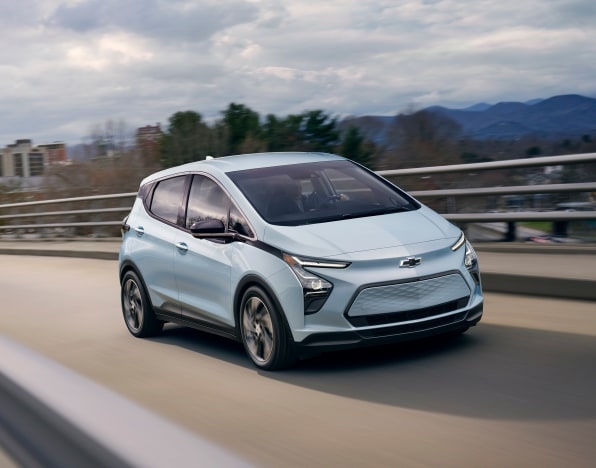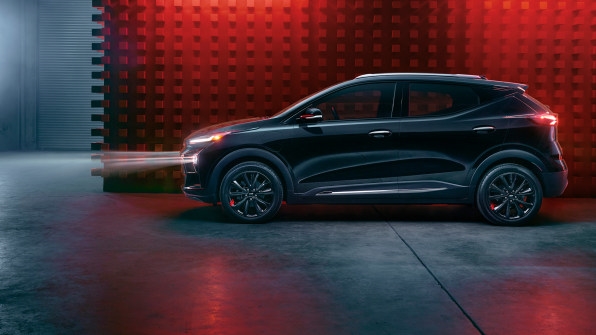Why did GM kill the Chevy Bolt, its most popular electric vehicle?
Branded is a weekly column devoted to the intersection of marketing, business, design, and culture.
Admittedly, there are reasons that General Motors’ decision to discontinue its pioneering Chevrolet Bolt line of electric vehicles isn’t a total shock. For instance, it’s only been a couple of years since GM had to order a highly embarrassing recall for the entire line because of battery fires. And the Bolt, while selling more than 140,000 vehicles from its 2016 debut through the end of last year, hasn’t been profitable.
And yet, there’s a very reasonable case to be made that dumping the brand is a mistake. For starters, it still has juice with its core customer base, not to mention auto analysts and critics, some of whom have called the decision “baffling,” and are recommending consumers snap up the last Bolts while they can. Moreover, Bolt’s affordable positioning helped give it a distinct identity in an EV landscape that has until recently been dominated by the Tesla brand, which is lately looking more vulnerable. And as an early sign that GM seemed to be taking EVs seriously, it has contributed a bit of a halo to the legacy carmaker: It was Motor Trend’s car of the year for 2017, and picked by Time as one of the best inventions of 2016.

That’s a pretty good set of brand attributes at a time when EV sales have never been better—and government initiatives are prodding the category even closer to the mainstream: a rare combination of innovative ambition paired with practical accessibility. “The Bolt was (and is, so long as you can still find it) the best value in EVs you can buy today,” The Verge flatly declared.
The original Bolt hatchback model remains the most affordable EV, (starting at $27,500), followed by the Bolt EUV variation ($28,800). And because they’re made in the U.S., both are eligible for a $7,500 federal tax credit. Both travel in the 250-mile range on a full charge, which is plenty for many typical-use drivers. (The closest price competitor, the Nissan Leaf, starts around $29,000, but doesn’t qualify for the tax credit.)

The average cost of an EV is over $60,000, by one estimate. But as the market expands, affordability—and a reputation for affordability—may be crucial for attracting drivers interested in the promise that buying an EV can be an economical decision, especially for commuters weary of volatile gas prices. Certainly, as the mere fact of EV ownership ceases to be a status statement, value and economy will matter more and more. Thus, rivals like Volkswagen have lower-priced EVs in the works, and even Tesla has lately reduced prices as more cost-sensitive market dynamics seem to have cut into its market share.
While the Bolt obviously never attained the brand hype of Tesla, it steadily built a loyal customer base even while occasionally veering off course. Recalls in 2020 and 2021 were obviously a humiliating fiasco. Yet, remarkably, these did not convert the Bolt into a brand synonymous with safety concerns, like the Pinto and Corvair. To the contrary, sales showed strong momentum over the last year, selling “like hotcakes” in 2022, as CNN put it. In April of this year, the Bolt recorded its third straight monthly sales record.
The practical reasons for GM’s shifting gears on the Bolt have more to do with production considerations—notably, the automaker is moving to a different battery technology. But these are intertwined with marketplace strategies. The primary Bolt production facility is being revamped to manufacture EV pickups, as GM seems to be betting on higher-end electric vehicles. Nevertheless, it also plans to roll out a $30,000 utility EV under the longstanding Chevy Equinox brand, so it’s not giving up on the budget-focused market segment—just on the Bolt brand.
This seems, at best, premature. As a category, EVs are hardly so established that first-mover brands like Bolt start to look stodgy (like a Blackberry or a Palm Pilot). And Bolt, in particular, blended early-adopter gusto with bottom-line practicality in a way that seemed to charm its customer base. “I like showing off the Bolt and telling people, ‘Look, you can drive this electric car and afford it,’” one Bolt owner (who claimed to be looking to buy another Bolt while he could) told The Wall Street Journal.
It’s a shame GM felt it had to yank the plug. The Bolt brand seemed to have plenty of juice left.
(8)



